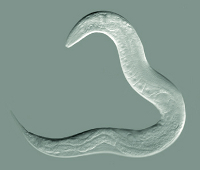 |
Image: Wikimedia commons, Bob Goldstein, UNC Chapel Hill |
**__Related stories:__***linkurl:MicroRNAs block translation machinery;http://www.the-scientist.com/news/display/53197/
[17th May 2007]*linkurl:DNA damage repair defect unifies theories of aging;http://www.the-scientist.com/news/display/38218/
[20th December 2006]*linkurl:Caloric restriction slows immune aging;http://www.the-scientist.com/news/display/37246/
[5th December 2006]*linkurl:Long live the worm!;http://www.the-scientist.com/blog/display/78/
[30th June 2005]












